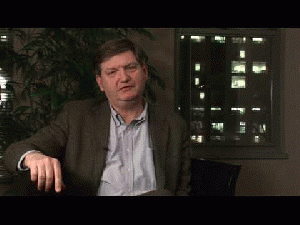Reprinted from http://dissenter.firedoglake.com
A divided federal appeals court ruled that a reporter for the New York Times did not have a reporter's privilege under the First Amendment or common law that would protect him from having to testify in a leak case against one of his sources.
by YouTube
The Fourth Circuit Court of Appeals reversed a district court order, which held Times reporter James Risen had reporter's privilege that entitled him "to refuse to testify at trial concerning the source and scope of the classified national defense information illegally disclosed to him."
The case involves a former CIA officer, Jeffrey Sterling, who face charges of violating the Espionage Act after he disclosed information to the press on a classified program "intended to impede Iran's efforts to acquire or develop nuclear weapons," which was published in Risen's book, State of War. [Note: It's referred to as Classified Program No. 1 in the ruling.]
The court declared, "There is no First Amendment testimonial privilege, absolute or qualified, that protects a reporter from being compelled to testify by the prosecution or the defense in criminal proceedings about criminal conduct that the reporter personally witnessed or participated in, absent a showing of bad faith, harassment, or other such non-legitimate motive, even though the reporter promised confidentiality to his source."
The "compelling interest" the government had to obtain "direct evidence that Sterling compromised" the government's "critical national security interests by disclosing classified information in violation of validly-enacted criminal laws" outweighed any privilege Risen might have.
Judge Roger Gregory wrote a dissenting opinion that defended freedom of the press:
"Undoubtedly, the revelation of some government secrets is too damaging to our country's national security to warrant protection by evidentiary privilege. Yet the trial by press of secret government actions can expose misguided policies, poor planning, and worse. More importantly, a free and vigorous press is an indispensable part of a system of democratic government. Our country's Founders established the First Amendment's guarantee of a free press as a recognition that a government unaccountable to public discourse renders that essential element of democracy -- the vote -- meaningless. The majority reads narrowly the law governing the protection of a reporter from revealing his sources, a decision that is, in my view, contrary to the will and wisdom of our Founders"
Gregory acknowledged that "freedom of the press is one of our Constitution's most important and salutary contributions to human history" and that "democracy without information about the activities of the government is hardly a democracy." And, "A citizen's right to vote, our most basic democratic principle, is rendered meaningless if the ruling government is not subjected to a free press's "organized, expert scrutiny of government.'"
He also argued that "public debate on American military and intelligence methods is a critical element of public oversight of our government."
Protecting the reporter's privilege ensures the informed public discussion of important moral, legal, and strategic issues. Public debate helps our government act in accordance with our Constitution and our values. Given the unprecedented volume of information available in the digital age -- including information considered classified -- it is important for journalists to have the ability to elicit and convey to the public an informed narrative filled with detail and context. Such reporting is critical to the way our citizens obtain information about what is being done in their name by the government.
Gregory cited Scott Armstrong, a former Washington Post reporter, to outline why a reporter needed to be able to keep sources confidential:
Scott Armstrong, executive director of the Information Trust and former Washington Post reporter, points to three ways in which investigative journalism uses confidential sources: "developing factual accounts and documentation unknown to the public," "tak[ing] a mix of known facts and new information and produc[ing] an interpretation previously unavailable to the public," and "publiciz[ing] information developed in government investigations that has not been known to the public and might well be suppressed." "It would be rare," Armstrong asserts, "for there not to be multiple sources -- including confidential sources -- for news stories on highly sensitive topics." In turn, "[m]any sources require such guarantees of confidentiality before any extensive exchange of information is permitted." Such guarantees of confidentiality enable sources to discuss "sensitive matters such as major policy debates, personnel matters, investigations of improprieties, and financial and budget matters." Even in ordinary daily reporting, confidential sources are critical. "[O]fficial government pronouncements must be verified before they are published," and this is frequently done through discussion with officials not authorized to speak on the subject but who rely on assurances of confidentiality. These discussions can often lead to "unique and relevant, contextual comments" made by the confidential source, comments that deepen the story.
Essentially, if reporter's privilege is not protected, a climate could further develop, where national security stories only include comments from spokespeople of agencies or institutions in government. Their comments would function like propaganda if what was said could not be independently confirmed but was accepted as true by reporters. The stories would help officials sell their agenda to the American people rather than merely informing citizens of key aspects of national security policies or programs.
Gregory found, "Common sense tells us the value of the reporter's privilege to journalism is one of the highest order." He noted that news organizations had submitted affidavits in support of Risen citing how confidentiality had allowed stories "critical to informing the public of the government's actions" to develop.
(Note: You can view every article as one long page if you sign up as an Advocate Member, or higher).






